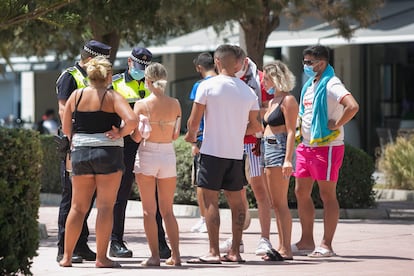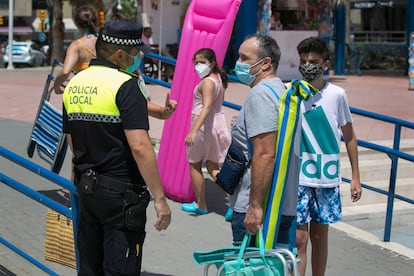How Spain’s face mask rules are being broken
Police officers relate the multitude of excuses employed by people to explain why they are not following the coronavirus safety measure

Rosario, a retired woman in Spain, walks with a friend down the Antonio Banderas seafront promenade, which lies to the east of the southern city of Málaga. She tries to be inconspicuous, but two local police officers clearly see her slyly taking a face mask out from her bag and putting it on. As the officers near, she changes her path to make it look like she’s about to enter a restaurant. “Miss, Miss, one moment,” Officer Puentes Soler calls after her. “You know that you have to wear a face mask at all times?” “It’s just that I’m coming from the beach,” replies Rosario, who shows him photos to prove that she was wearing the face covering hours earlier.
“‘I’m coming from…,' ‘I’m going to…,’ ‘I just left…,’ these are the excuses we hear over and over again,” explains Ángel, the second officer on duty, who opted not to give his surname. Both belong to the Málaga local police – the force that has issued the greatest number of fines for failure to wear face masks since the Andalusian regional government made the measure mandatory in all public spaces – regardless of whether social distancing rules can be respected – on July 15.

The two officers have been instructed to prioritize making sure face mask rules and safe-distancing measures are being met, and that large gatherings are being controlled. In Málaga, more than 150 fines are issued every day. It’s a similar situation in all of Spain’s 17 regions, with the exception of the Canary Islands, which is the only area that has not made face masks mandatory. In Valencia, more than 200 fines are issued a day. In Zaragoza, in the Aragón region, which has seen a sharp spike in Covid-19 cases, the figure is around 120. In the Basque cities of Bilbao and Vitoria around 150 fines are issued a week – the same number in Ceuta, Spain’s exclave city in North Africa. In Barcelona, the number is around 100 a week, according to the local police, and in Seville, in Andalusia, on some weekends, more than 60 fines can be issued in a single night.
For Aarón Cano, the public security councilor in Valencia City Hall, the figures show that “respect for Covid-19 has been lost.” “It’s an act as simple as putting on a face mask in the street, it’s not that complicated,” he says. Many municipalities have launched campaigns to raise awareness of the safety measure, which is key to curbing the spread of Covid-19.
I’m coming from…,' ‘I’m going to…,’ ‘I just left…,’ these are the excuses we hear over and over againPolice officer in Málaga
The number of fines may appear high, but they are in fact small when the extent of the rule-breaking is seen. Just a minute after warning Rosario, the officers come across a group of French tourists some 50 meters from Málaga’s La Misericordia beach. Of the three girls and three guys, all around 20 years of age, only one of them is wearing a face mask. One of the women argues in French that she has a drink in her hand. Another is smoking. The rest bow their heads, hand over their IDs and listen to police explain why face masks must be worn.
Next up, the officers tell a family from Madrid that their adolescent son needs to put on a face covering. As soon as the police leave the scene, people drop their guard. A girl in a bikini passes by on a skateboard without a mask; a young man types a message on his cellphone with no face covering; and three women, carrying a beach umbrella, towels and sun loungers – but wearing no masks – cross the road. “We live here, we don’t need to,” the women say.
Walking with a bottle in hand is the perfect excuse not to wear a face mask. “They tell you they are drinking, but they’ve been holding [the bottle] for an hour,” the police officers explain. Sport is another popular excuse: people walking down the seafront promenade claim they don’t have the protective covering because they are doing physical activity, “when it is clear they are not.” Then there are others who put a neck scarf or shirt over their mouth and nose.
Civil responsibility
In many cases, civilians are calling police to report someone for breaking the rules. “I have never seen so many notifications,” says Ángel. Before meeting EL PAÍS, the officer had been at a bakery that was reported because the attendant was not wearing a mask. Other times, patrons of restaurants call police to report waiters without face coverings, beachside restaurants with tables too close together or bars that are over capacity. In some cases, offenders are given a warning, but in others they are fined €100. “Especially those who are directly not wearing a mask, or who are rude and say they are not using it because they don’t feel like it,” says another policeman.
According to the local officers in Málaga, the worst offenders are people between the ages of 15 and 25. This is clearly seen on the weekends, when young people gather for outdoor drinking sessions, known in Spanish as botellones, or in large groups on the beach. Nighttime venues are another problem area, as evidenced by the constant flow of complaints from neighbors. Then there are the large social gatherings – with as many as 100 people – in places people think the police won’t be able to reach: residential estates in the mountains, open fields in the middle of nowhere, and uninhabited areas.
“There are many cases and it is impossible for us to be everywhere at once,” explains a deputy inspector of the local police force. “And of course, there are still thefts, gender violence, traffic accidents, drunk driving… and we are stretched to the limit.” Every morning, the officers patrol Málaga city, which is home to 600,000 people, but has just 120 local police officers. “The message that has to get through is that wearing a mask can’t be left up to police pressure: it is a question of individual responsibility that benefits all of society,” says another officer, who calls on the public to simply show empathy and common sense.
English version by Melissa Kitson.
Tu suscripción se está usando en otro dispositivo
¿Quieres añadir otro usuario a tu suscripción?
Si continúas leyendo en este dispositivo, no se podrá leer en el otro.
FlechaTu suscripción se está usando en otro dispositivo y solo puedes acceder a EL PAÍS desde un dispositivo a la vez.
Si quieres compartir tu cuenta, cambia tu suscripción a la modalidad Premium, así podrás añadir otro usuario. Cada uno accederá con su propia cuenta de email, lo que os permitirá personalizar vuestra experiencia en EL PAÍS.
¿Tienes una suscripción de empresa? Accede aquí para contratar más cuentas.
En el caso de no saber quién está usando tu cuenta, te recomendamos cambiar tu contraseña aquí.
Si decides continuar compartiendo tu cuenta, este mensaje se mostrará en tu dispositivo y en el de la otra persona que está usando tu cuenta de forma indefinida, afectando a tu experiencia de lectura. Puedes consultar aquí los términos y condiciones de la suscripción digital.









































